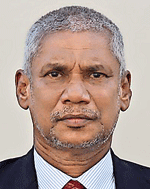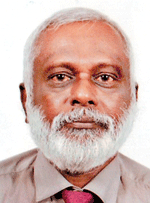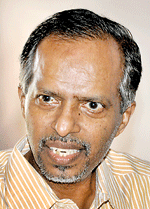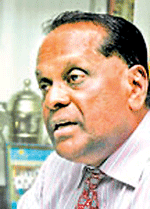Are they too old to hold office and, is politics a hurdle!
View(s):There is a move by the Ministry of Sports (MoS) to limit the age of office bearers of Sports bodies to 70. At the same time, the ministry is also eyeing to bar persons in active politics from holding office in Sports bodies. Here are some views of the issue at hand.
 Susil Ranasinghe
Susil Ranasinghe
(Assistant Secretary- National Olympic Committee and former Secretary – Sri Lanka Volleyball Federation)
My views on the new sports regulations’ age limit provision and politicians holding office in Sports bodies, are hotly debated among sportsmen, politicians, sports administrators, sports enthusiasts and interested public. First, the issue of an age limit for Sports administrators. Fixing an age limit has many advantages for Sports bodies, sportsmen, public and the country. We have a large younger population. The younger generation should be promoted and trained to take up leadership roles within Sports bodies.
We must pump young blood into Sports bodies so that, Sports bodies will become dynamic and create best sporting talent to compete internationally and play a lead role in national, regional and international Sports activities. Older Sports administrators should set an example by giving way to younger administrators to take up leadership role in Sports bodies. It is also the international trend. As an example, of the 28 international Sports bodies affiliated to the International Olympic Committee (IOC), 80% are headed by presidents below 70 years, which includes IOC President Thomas Bach (63).
I would like to cite the Delhi High Court case decision on November 2, 2010. A bench headed by Chief Justice Deepak Misra, directed the Central Government to fix the upper age limit to 70 years, for heads of Sports bodies, and limiting their terms to a maximum 12 years. This is a good example for us to follow. We must change with the times. The argument is that, if politicians can run the country, they also have the ability to run Sports bodies as well. We must remember that, as a politician, current President Maithripala Sirisena, when he was a Minister, headed the National Swimming Association and former President Mahinda Rajapaksa headed the Athletic Body of Sri Lanka and the Sri Lanka Elle Federation.
 Likewise, for example, while being politicians, the late V.A. Sugathadasa, became the NOC Head in Sri Lanka, Dr N.M. Perera (Cricket), Lakshman Jayakody (Cricket), Gamini Dissanayake (Cricket), Lalith Athulathmudali (Athletics) Reggie Ranatunga and Dilan Perera (Volleyball), also headed Sports bodies. Those leaders, while administering Sports bodies, did not mix politics with Sports but, developed Sports with devotion, commitment and also with National interest. There are other examples such as Sanath Jayasuriya and Arjuna Ranatunga- sportsmen becoming politicians and leaders. Internationally, Imran Khan (Pakistan), Sebastian Coe (Britain), Garry Kasparov (Russia) and Indian BCCI Chief Anurag Thakur are good examples that sportsmen became good politicians.
Likewise, for example, while being politicians, the late V.A. Sugathadasa, became the NOC Head in Sri Lanka, Dr N.M. Perera (Cricket), Lakshman Jayakody (Cricket), Gamini Dissanayake (Cricket), Lalith Athulathmudali (Athletics) Reggie Ranatunga and Dilan Perera (Volleyball), also headed Sports bodies. Those leaders, while administering Sports bodies, did not mix politics with Sports but, developed Sports with devotion, commitment and also with National interest. There are other examples such as Sanath Jayasuriya and Arjuna Ranatunga- sportsmen becoming politicians and leaders. Internationally, Imran Khan (Pakistan), Sebastian Coe (Britain), Garry Kasparov (Russia) and Indian BCCI Chief Anurag Thakur are good examples that sportsmen became good politicians.
Singapore is a country where it is fairly common for Singapore’s Sports Organisations to be run by politicians. Even in Japan, politics and Sports seem to be a good mixture. For example, Seiko Hashimoto, an Olympic Gold Medallist, became a Councilor and headed many Sports bodies. So, Sports and politics have become a good mix. Generally, the politics and Sports mix, in many instances, gave birth to Sports diplomacy. Sports diplomacy described the use of Sports as a means to influence diplomatic, social and political relations. Sports diplomacy cuts across cultural differences and brings people together. The recent speeches of President Maithripala Sirisena and MoS Dayasiri Jayasekera in Jaffna, at the closing ceremony of the National Sports Festival, are good examples for Sports Diplomacy in Sri Lanka. This happened for the first time. Finally, Sports should not be used to promote politics. According to BCCI President Anurag Thakur, ”If political leaders capture Sports bodies to promote politics, then, it is wrong.”
 K.S. Peiris
K.S. Peiris
(Retired Deputy Director Sports, Department of Sports Development)
Always, there is good and bad in this law, in restricting the age to 70 years, for administrators in National Sports Bodies and at the NOC. A total of 24 Olympic Sports Bodies are affiliated to the NOC. A majority of the office bearers in these Associations are over 70 years. It is with their valuable votes that, the President and other NOC officials have survived for nearly 20 years. I think the dominance of the NOC officials will be shattered with the introduction of this new law by MoS Dayasiri Jayasekera. This is a very good decision by the Minister, and should be implemented. The other side of the story is that, the lifespan of people has increased in the recent past. I think, a 70-year-old has the potential to perform the task of a 60-year-old these days. They are very energetic and capable of handling things under pressure.
We have a lot of things to learn from their experience and knowledge in administration. As a result, we should pick and chose the most suitable from these officials, and place them in the correct positions. We have Deva Henry in Rowing, Kenny Joseph in Yachting and Prema Pinnawela (former) in Athletics, who are pillars of their respective sports. However, Henry and Joseph have done nothing for the development of the Sport, but Pinnawela has been a great inspiration for Athletics in Sri Lanka. We should retain those who are over 70 years and are capable of promoting Sports in the country. According to the Sports Law, Chapter 14: ‘Those who have not done Sports cannot hold office but, still could be elected with special permission from the MoS. Likewise, the MoS should be able to grant special permission to those over 70 years and still capable of performing their task to perfection, to remain in office. Getting rid of all officials who are over 70 years is not the ideal solution. I am not against the appointment of politicians into office, as long as they have the qualification of having represented the game at the highest level. He should also have excellent administrative skills. If we try to prevent them from coming to office, it will be a violation of their fundemental rights.
 Amal Suriyage
Amal Suriyage
(President- Mountain Biking Association of Sri Lanka)
I call this ‘vindictive rules’ in the name of Sport. This amounts to fundemental rights violations. Age is no barrier, as long as the man/woman is able to deliver. In fact, recently, President Maithripala Sirisena made it clear, when he said, “We lose the services of people in their prime when he/she is compelled to retire at 55.” Research has proved that the human attains maturity and becomes an all-rounder when he is 50 and, no matter how good you are in Sri Lanka, retirement is compulsory at 55. America use its human resources to its fullest capacity and believes that, as long as the man/woman is fit, he/she can continue to work, and this has proved very productive. Remember the old quote, “Older the Bull, harder the horns”. Sri Lankan society has the habit of looking down upon people who are ambitious and climbing the ladder of success, and if rules are made with the intention of stopping them, it becomes vindictive. Sports needs people with drive, maturity and vision. Otherwise, it becomes a stalemate. Politicians coming into Sport bodies is not an issue, when everything else in this country is politicised. So, why don’t we use their political clout as a marketing tool and raise funds for Sport. God Bless Sports in Sri Lanka!
 Prema Pinnawela
Prema Pinnawela
(Former Secretary- NOC and former Secretary- Athletic Association of Sri Lanka)
I started my Sports administration in 1978 with Hockey. I was the Secretary of the Nationalised Services Hockey Association and Nationalised Services Athletic Association for 16 years. I was also the Secretary and Vice-President on several occasions from 1986 to 2014. In between, I was NOC Secretary for 14 years, from 1983 to 1997. I am proud to say that, along with former NOC President, Roy Silva, pioneered the South Asian Games (SAG). As a result, we were able to organise the inaugural SAG in Kathmandu in 1984. I was appointed by the IOC as the first Sri Lankan NOC Member to the IOC Commission in 1997. I was also the IOC Course Director for 4 years. I received the IAAF Veterans Pin in 2005. I was the only person to be invited to the IAAF Centenary in 2012. I came to know that the Sports Ministry is hoping to introduce a new law pertaining to the age limit of office bearers.
Actually, this new law is a violation of fundemental rights. The IAAF also brought up a new law restricting the age limit of office bearers to 70 years. But now, they are regretting, and are planning to change that law, allowing officials to be elected for 3 successive terms. It must be noted that, these officials, except the Chief Executive Officer, are performing a honourary job. I think, it is unfair to bring in various restrictions against these hardworking officials. I think, a matured person has the ability to deliver more with his/her experience. Their vast knowledge is very important for the promotion of the Sport. A lot of senior officials lost their opportunities, following the earlier Sports law, which restricted the terms of each office bearer to 2 successive years.
As a result, many veteran Sports administrators lost out on serving the country. We have a lot of newcomers now serving in different Sports bodies. But they have little experience in handling international matters. As a result, the quality of the administration dropped drastically. It is because of his popularity that, a person who is above 70 years, could be elected to the highest position. It is a clear violation of fundemental rights in preventing these capable administrators from continuing to hold office in their respective associations. For example, the Secretary of the Asian Athletic Association, Maurice Nicholas, is 84-years-old, and has been in office for over 20 years. He is able to remain in office because of his capabilities and experience.




